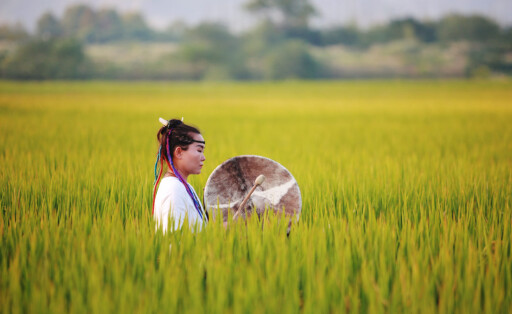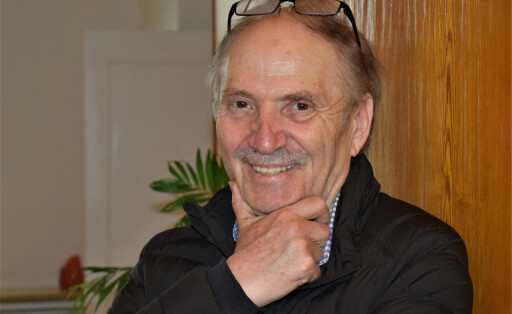




Bartholomäus Grill is Germany's best-known Africa correspondent. Over the past 40 years, he witnessed how China continuously expanded its presence on the continent. Nevertheless, he believes that prejudices about Chinese neo-colonialism are wrong. In the new "race for Africa," the People's Republic is taking a more far-sighted approach than the Europeans. Fabian Peltsch spoke with Grill.
By Redaktion Table

More and more young Chinese flee the stresses of city life and head for the countryside. The government encourages this trend by creating "beautiful villages" for young creative individuals and by shaping poor farmers into better consumers.
By Fabian Peltsch


The ideologists among China's party leaders are clearly fond of numbers. They can be found in many of Mao Zedong's slogans, and Xi Jinping also likes to use catchy ciphers. In the last ten years, the political language in China changed; with a dictionary alone, some terms in the party language cannot be deciphered. Very good language skills, effort and the Internet can help.
By Experts Table.Briefings


Since 2016, China's President Xi Jinping has been propagating a "Sinicization of religions". Religious communities are tolerated – but only if they are subordinate to socialism. Muslim communities are being "renovated" accordingly, for example, the Niujie district in Beijing or the Nanguan Mosque in the northwestern Chinese city of Yinchuan.
By Redaktion Table

Against expectations, "Return to Dust," a movie about the troubles of the poor rural population, has become a box-office hit in China. But since its powerful images undermine Xi Jinping's success story of the fight against poverty in the countryside, it has now fallen victim to the censorship authorities. China's movie fans are outraged.
By Redaktion Table
The culture in China has developed over thousands of years with influences from many peoples and nations. With communism, a change took place. The Table.Media editorial team has all the news about culture in China.
China is considered one of the oldest cultures in the world. First writings are up to 3,500 years old. Confucianism - one of China's three worldviews - dates back to the fifth century BC. Daoism is about the same age. The third culture, Buddhism, entered China around the year zero. The culture in China developed undisturbed for a long time and constantly received new influences and nuances through the lively trade and exchange with other countries and peoples via the Silk Road. The Opium War with Great Britain and European colonialism were decisive incursions.
When communism was first introduced in the newly founded People's Republic in the 20th century and then a cultural revolution took place in the 1960s and 1970s, central aspects of Chinese popular culture were completely reinvented. Since then, it has served primarily to morally educate citizens and to disseminate the policies of the Chinese Communist Party. Culture in China, like the individual himself, must subordinate itself to the common good. Accordingly, on March 1, 2021, the Communist Party issued rules of conduct that affect an entire industry. Since then, artists in China have had to adhere to a guideline with 15 instructions. This affects musicians, actors, magicians and comedians, among others.
The guide with instructions for artists in China includes commandments such as "love for the Party and its principles" or service to "the people and socialism." Likewise, it is forbidden to denigrate China's history or show solidarity with Tibetans or Uyghurs. Prominent cultural figures in the People's Republic are also prohibited from misleading consumers by "appearing in commercials" or engaging in "religious practices." The background to this is that the Communist Party in China also feels responsible for the moral education of its citizens. Adherence to the rules is monitored by an ethics committee made up of "exemplary artists. Those who violate the requirements face up to five years' professional ban and retraining. Although the guidelines are new, the monitoring of the content of culture in the People's Republic is not. Artists have been the focus of attention ever since Mao Zedong. China's President Xi Jinping has already made it clear that art and culture must serve socialism.
The Communist Party's treatment of the culture of minorities in the country also shows how important culture is for the identity of a people. An extreme example is autonomous region of Xinjiang in the northwest, the territory of Muslim Uyghurs. The Chinese Communist Party deliberately settles Han Chinese in Xinjiang. They now make up 46 percent of the population there. Uyghur human rights activists accuse the government of Sinicization. The native culture of the Uyghurs is being deliberately pushed into the background. In addition, there are re-education camps in which Uyghurs are forced to adopt the values and culture of the Han Chinese, among other things.
The Communist Party is also consistently cracking down on the music industry. In the eyes of President Xi Jinping, hardly any other group has so much influence on China's youth. Accordingly, tattoos, earrings and inappropriate language are banned. The state newspaper Global Times commented, "The more popular you are, the more you must discipline yourselves; the more popular you are, the more you must obey the law." The most popular way to listen to music in China is through the streaming service Tencent Music. The service is so popular that in 2021 the market regulator SAMR had to take action against the group's monopoly position. As a consequence, Tencent Music had to dissolve exclusive rights to music labels.
Film plays a particularly important role in China's culture. Not only is the People's Republic the largest cinema market in the world, but the Communist Party's soft power strategy is also to be implemented via the screen. In essence, this is about making a state stronger and more attractive through its foreign policy appearance, its political values and its culture. Because of China's undiplomatic behavior and its serious human rights violations, film plays a particularly important role. Investments are correspondingly high. In 2018, businessman Wang Jianlin had the world's most modern studio complex built in the eastern Chinese city of Qingdao. At a cost of 6.5 billion euros, 40 film studios were built there. Jianlin also owns the film studio Legendary Entertainment ("Jurassic World," "Batman: The Dark Knight Trilogy"). In parallel, Amblin Partners, Steven Spielberg's production company, has agreed to cooperate with China's Alibaba Group. Despite all these investments, Chinese blockbusters are rarely shown outside the country. This is also because the films are mostly propaganda works. They have to adhere to the guidelines for artists in China and are censored as soon as they are made. Conversely, only 34 foreign productions are allowed to be shown in China each year. In order to get past state control, the films - such as "The Martian" or "James Bond: Skyfall" - must in some cases be massively recut and altered.
Culture in China is also shaped by the political interests of the Communist Party in the field of literature. Says Jiang Yu of the Development Research Center, "Art and literature are important battlegrounds for ideas and ideology, and thus extremely important to the Party's work." Also popular abroad and supported by the state in China are science fiction works. The background is that the entire society is very future-oriented. The People's Republic's space program, futuristic cities and a high affinity for technology do the rest. Television series and films are also produced from the works of Chinese authors. For example, the Trisoloris trilogy by Liu Cixins, which is being adapted for Netflix.
Video games are part of the culture in China. But since the corona pandemic, when children were forced to stay indoors and increasingly turned to games, the state has wanted to intervene in a regulatory capacity. This affects an industry worth billions. The turnover of the Chinese games industry was a whopping 35 billion euros in 2020. The Communist Party therefore has plans to exempt the games industry from tax breaks. Actually, this is an industry of the future that should be massively promoted. But the industry is no longer in the start-up phase. The argument is that billion-dollar corporations like Tencent should pay something back in the form of taxes.
Tencent, the world market leader in video games, wants to accommodate the Communist Party because of this. For example, the company is voluntarily limiting the daily playing time for the hit title "Honor of Kings". During the week, users are only allowed to play it for one hour. Only two hours on weekends. But a stricter youth protection law that makes it more difficult for players to circumvent this block was not prevented by Tencent in this way. Another sign that the games industry in China is losing favor with the Communist Party is the tone the press is taking towards video game companies. These would sell "intellectual opium". Because of the Opium Wars against Great Britain, this comparison is historically charged and considered a serious attack. China's President Xi Jinping has also taken a clear position. Games were among the "dirty and obscure things to be found online," he said in a report by Xinhua news agency.
In China, there are four traditional garments that are part of the country's culture. The hanfu is the oldest Chinese clothing. This is a silk robe - a garment with a four thousand year old tradition. Men also often wear a Zhongshan suit, also called a Mao suit. The Tang suit has its roots in the Tang Dynasty (the years 619 to 907). Perhaps the most famous wearer of the black jacket is Bruce Lee. The fourth traditional garment is the cheongsam. A long dress. In modern times, fashion in China - and thus part of the culture of the People's Republic - is dictated by fast fashion. The market leader is the fashion platform Shein. It sells cheap clothing for women. The cost is five to twenty dollars per item. The design is created by an artificial intelligence. In one week in May 2021, the system designed 30,000 new garments to serve tastes in each region in the shortest possible time. Only five to seven days pass between the design by the artificial intelligence and the first pieces being put on the sales shelf.
China's culture could see a major shift in the coming years due to demographic changes. China's population is getting older. The relaxation of the one-child policy in 2016 and also the relaxation of the two-child policy in 2021 came too late to noticeably change the demographics in China so far. All news about culture in China in German is available from the Table.Media editorial team.